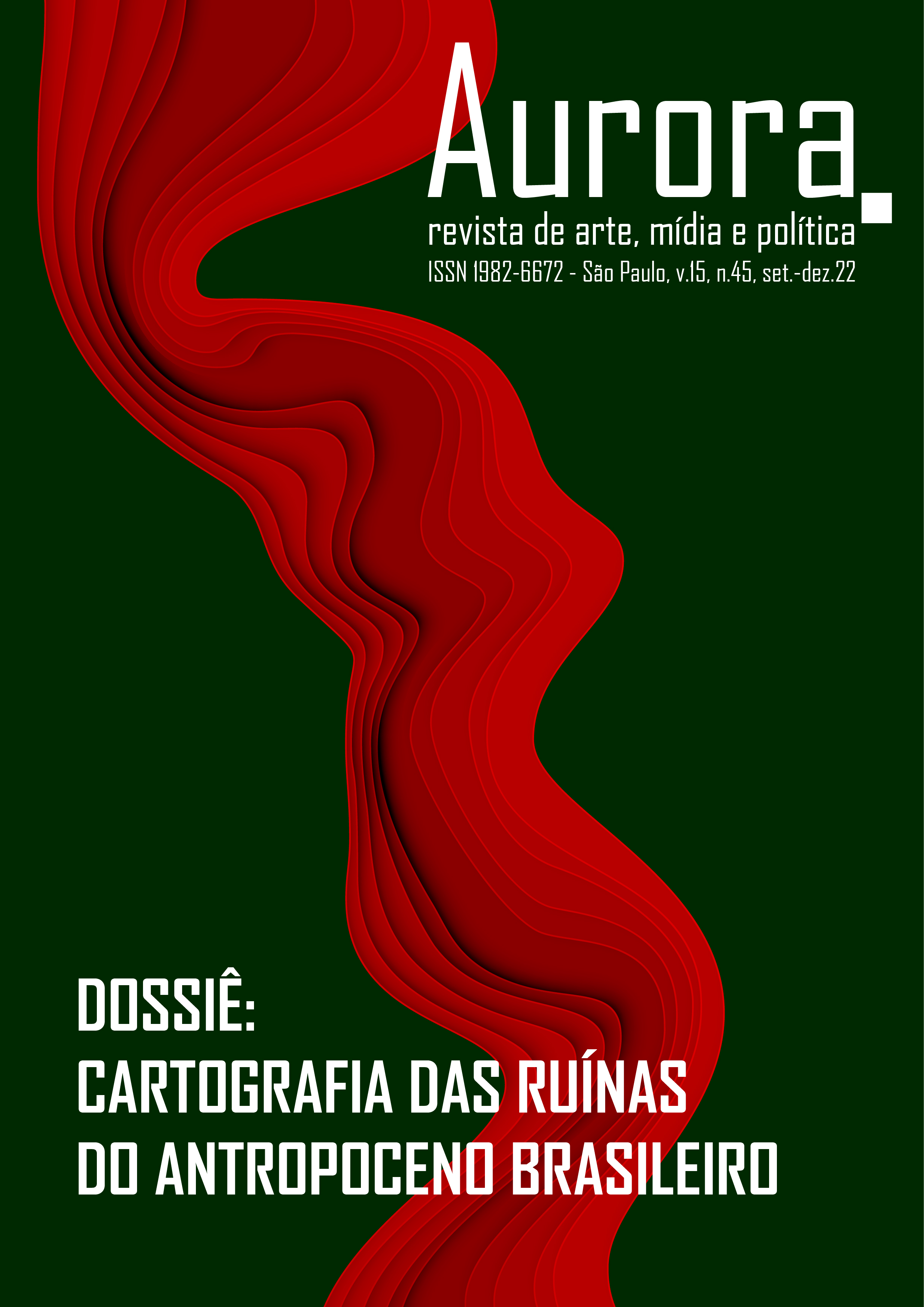As múltiplas temporalidades da infraestrutura
cidades atômicas e a memória de futuros perdidos
DOI:
https://doi.org/10.23925/1982-6672.2022v15i45p117-134Palavras-chave:
Antropoceno, usinas nucleares, cidade atômica, mito do progressoResumo
Usinas nucleares, com sua promessa de energia a baixo custo e sem limites, são arquetípicas do progresso da modernidade. Ao reconhecermos os limites do progresso industrial e do capital baseado no crescimento, lugares onde o sonho acabou, cujos habitantes estão encontrando modos de vida em meio à transição oferecerem ontologias práticas emergentes baseadas em manutenção, bricolagem e necessidade. Através de um estudo de caso da cidade atômica de Visaginas, na Lituânia, este artigo aborda a questão sobre como dar conta das formas de vida que surgem em um contexto de esgotamento da alta modernidade. Aqui, infraestruturas operam como recursos culturais e materiais residuais para ontologias práticas e para a construção do mundo pós-progresso. Com base em uma discussão sobre a estética política da infraestrutura, sugiro que sua transição ontológica envolve o que Mark Fisher descreve como a “memória de futuros perdidos”, um futuro anterior que, através dos restos de conexões materiais, de tecnoculturas ede memória cultural fornece limites e condições para formas de vida emergentes “pós-progresso”.
Referências
ANAND, N. A public matter: Water, hydraulics, biopolitics. In: ANAND, N.; GUPTA, A. and APPEL, H. (eds). The Promise of Infrastructure. Durham and London, Duke University Press, 2018, p. 155–172.
BALOCKAITE, R. Coping with the unwanted past in planned socialist towns: Visaginas, Tychy, and Nowa Huta. Slovo, 2012, 24: 41–60.
BAUBINAS, R. and BURNEIKA, D. Social Consequences of Closing the Ignalina NPP. Geografija, 2001, 37: 69–75.
BERLANT, L. (2016) The commons: Infrastructures for troubling times. Environment and Planning D: Society and Space, 2016, 34: 393–419.
BERMAN, M. All That is Solid Melts into Air: The Experience of Modernity. Brooklyn, NY, Verso, 1983. [Tudo que é sólido desmancha no ar, trad. bras. Carlos Felipe Moisés e Ana Maria L. Ioriatti. São Paulo, Companhia de Bolso, 2007.]
BROWN, K. L. Plutopia: Nuclear Families, Atomic Cities, and the Great Soviet and American Plutonium Disasters. New York, Oxford University Press, 2013.
DAWNEY, L. Figurationing. In: UPRICHARD, E.; LURY, C; FENSHAM, R. et al. (eds). Routledge Handbook of Interdisciplinary Research Methods. London, Routledge, 2018.
DAWNEY, L. Decommissioned places: Ruins, endurance and care at the end of the first nuclear age. Transactions of the Institute of British Geographers, 2020a.
DAWNEY, L. Dramatising deindustrialisation. In: PRICE, W.; Rhodes, M. and WALKER, A. (eds). Geographies of Post-Industrial Memory, Place, and Heritage. London, Routledge, 2020b.
FISHER, M. Ghosts of my Life: Writings on Depression, Hauntology and Lost Futures. Winchester, UK, John Hunt Publishing, 2014. [Fantasmas da minha vida: Escritos sobre depressão, assombrologia e futuros perdidos, trad. bras. Guilherme Ziggy. São Paulo, Autonomia Literária, 2022].
HARVEY, P. and KNOX, H. The enchantments of infrastructure. Mobilities, 2012, 7: 521–536.
HECHT, G. Being Nuclear: Africans and the Global Uranium Trade. Cambridge, MA, MIT Press, 2012.
HETHERINGTON, K. Surveying the future perfect: Anthropology, development and the promise of infrastructure. In: Infrastructures and Social Complexity. London: Routledge, 2016, p. 58–68.
JENSEN, C. B. and MORITA, A. Introduction: Infrastructures as Ontological Experiments. Ethnos, 2017, 82: 615–626.
JONES, B. M. (Com)Post-capitalism: Cultivating a more-than-human economy in the Appalachian Anthropocene. Environmental Humanities, 2019, 11: 3–26.
KIRKSEY, S. E.; SHAPIRO, N. and BRODINE, M. Hope in blasted landscapes. Social Science Information, 2013, 52: 228–256.
KOHN, M. Dreamworlds of deindustrialization. Theory & Event, 2009, 12.
LARKIN, B. The politics and poetics of infrastructure. Annual Review of Anthropology, 2013, 42: 327–343.
LARKIN, B. Promising forms: the political aesthetics of infrastructure. In: ANAND, N.; GUPTA, A. and APPEL, H. (eds). The Promise of Infrastructure. Durham, Duke University Press, 2018, p. 175–202.
MASCO, J. The Theater of Operations: National Security Affect from the Cold War to the War on Terror. Durham, Duke University Press, 2014.
PAPADOPOULOS, D. Experimental Practice: Technoscience, Alterontologies, and More-than-Social Movements. Durham, NC, Duke University Press, 2018.
PITKANEN, L. and FARISH, M. Nuclear landscapes. Progress in Human Geography, 2018, 42: 862–880.
RINGEL, F. Post-industrial times and the unexpected: Endurance and sustainability in Germany’s fastest-shrinking city. Journal of the Royal Anthropological Institute, 2014, 20: 52–70.
RINGEL, F. The production of indeterminacy: On the unforseeable futures of postindustrial excess. In: ALEXANDER, C. and SANCHEZ, A. (eds). Indeterminacy: Waste, Value, and the Imagination. Oxford, Berghahn, 2018, p. 68–88.
ROBBINS, J. Beyond the suffering subject: Toward an anthropology of the good. Journal of the Royal Anthropological Institute, 2013, 19: 447–462.
SCHWENKEL, C. (2018) The current never stops: Intimacies of energy infrastructure in Vietnam. In: ANAND, N.; GUPTA, A. and APPEL, H. (eds). The Promise of Infrastructure. Durham and London, Duke University Press, 2018, p. 102–129.
ŠLIAVAITĖ, K. ‘Homeland is where everything is for the people’: The rationale of belonging and _ citizenship in the context of social uncertainty. In: KNUDSEN, I. H. and FREDERIKSEN, M. D. (eds). Ethnographies of Grey Zones in Eastern Europe: Relations, Borders and Invisibilities. New York, Anthem Press, 2015, p. 107–122.
TSING, A. L.; BUBANDT, N; GAN, E. et al. Arts of Living on a Damaged Planet: Ghosts and Monsters of the Anthropocene. Minneapolis, MN, University of Minnesota Press, 2017.
Downloads
Publicado
Como Citar
Edição
Seção
Licença
Copyright (c) 2023 Aurora. Revista de Arte, Mídia e Política

Este trabalho está licenciado sob uma licença Creative Commons Attribution-NonCommercial-ShareAlike 4.0 International License.










